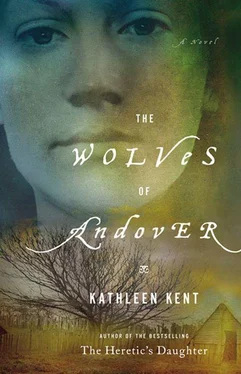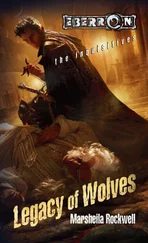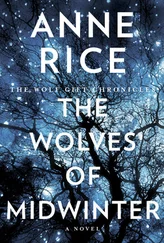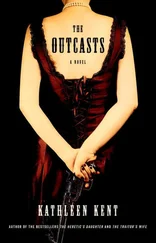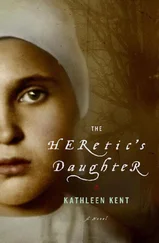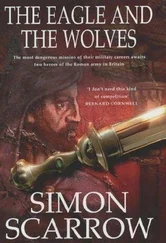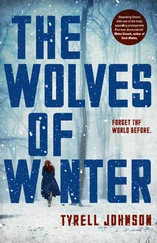Kathleen Kent
THE WOLVES OF ANDOVER
A Novel
Lord, thou knowest how busy I must be this day; if I forget thee, do not thou forget me.
—SIR JACOB ASTLEY, prayer before the Battle of Edgehill, English Civil War
I had rather a plain russet-coated Captain, that knows what he fights for, and loves what he knows, than that which you call a Gentle-man and is nothing else.
—OLIVER CROMWELL
[The Celts] were chopped down with axes and swords but the blind fury never left them while there was breath in their bodies.
—PAUSANIAS, Greek historian
THE WOLVES OF ANDOVER is a work of fiction. However, many of the novel’s chief characters are based on actual people. Thomas Carrier, also referred to in early documents as Thomas Morgan the Welshman, does appear in the town records of Andover and Billerica, Massachusetts, during the second half of the 1600s. What is certain about him is that he was married to Martha Allen Carrier, who was hanged as a witch in Salem in 1692; had children with her; and died in Colchester, Connecticut, aged 109 in 1735. What is less certain, and most likely unsupportable, is that he fought in the English Civil War and was one of the executioners of King Charles I of England. These stories are based on family legends and local Massachusetts lore. Some historical sources give the name of Richard Brandon, the Hangman of London, as the actual executioner, although it was widely believed that he refused absolutely to cut off the head of an anointed king.
In the novel, Thomas and Martha marry in the fall of 1673; in reality, they were married by a Captain Daniel Gookin (not yet made a general) in May of 1674, Martha most likely pregnant with their first child, Richard. Captain Gookin, already well established as a landowner in the colonies, had accompanied Cromwell’s confederates and fellow regicides Edward Whalley and William Goffe on the Prudent Mary from Gravesend to Boston in 1660.
John Dixwell, living under the assumed name James Davids in Connecticut, was one of the regicides, a judge who signed the warrant of execution for King Charles I, living “in plain sight” in the colonies.
The spy rings of Henry Bennet, Earl of Arlington, and Sir Joseph Williamson were very real—ruthless and extremely effective in gathering foreign and domestic intelligences during the Restoration period. Thomas Blood (renamed Tiernan Blood in the novel) was a historical figure who successfully penetrated the defenses of the Tower of London, stealing the Crown jewels. He was arrested, and after demanding, and getting, a private audience with King Charles II, he was pardoned. He went on to be a successful spy until his death in 1680.
London, England, April 1649
THE WOMAN WORKED her way out of the crowd, grabbing Cromwell by the cloak, and pulled at it until he turned to face her. She was small with plain wheat-colored hair, but the blush in her cheeks was high, as with a fever, and her voice was surprisingly deep.
She said to him, “Sir, will you stay and speak with us?”
He had a mind to pull his cloak roughly from her grasp and move away into the darkened safety of the House of Commons, but he looked over the shifting, enclosing mass of the hundreds, perhaps thousands, who had come to petition him to release the imprisoned leaders of the Leveller movement and he tempered his voice to a fatherly tone. “It is not for women to petition, missus. You should be home at your plates and bowls.”
“Sir,” the woman said, “we scarce have any dishes left to tend, and those we have we are not sure to keep.”
The minister of Parliament who had been close at Cromwell’s heels, and who was eager to pass into the Great Hall, said with little patience, “I find it strange that women are now petitioning.”
The woman cut her eyes to the man and said immodestly, “That which is strange is not of necessity unlawful.” When the minister brushed past her, she turned back to Cromwell and said bitterly, “It was strange that you cut off the king’s head, yet I suppose you will justify it.”
He stopped and this time he did pull his cloak roughly out of her hands. The supreme impudence of this little mouse, he thought, and turned the full import of his gaze on her. It was a gaze that had faced down generals in the field, brought court councilmen to anguished tears, and, some said, had looked without remorse or pity into the sightless eyes of the king as he lay in his lead-lined casket. There had been a time when he would have listened to the harpings of local women such as this, and their workaday husbands, when they still had the means to pay for armaments and food and fill the ranks with fighting bodies. But the Great War was over and he was nearly done with rubbing against the masses and would soon leave such rustic negotiations to the county councilmen.
He motioned impatiently for her to move away but she planted her foot in front of him and called out hoarsely, “If you take away the lives of our leaders, or the lives of any contrary to law, nothing shall satisfy us but the lives of them that do it.”
To his dismay he could feel the crowd pushing against them towards the open entranceway of the House. At first he had seen only women in the surrounding faces, but he realized they were solely at the fore, being shored up from behind by common men as well as rebellious soldiers, some of whom had raised their cocked pistols into the air. He watched as twenty or so men rushed into the House, shouting, “Free them, free them, free them…”
Now half the day would be spent clearing the hallways of quarrelsome, menacing dissenters, his suit to raise the urgent funds needed to invade Ireland delayed for Christ knew how long.
The woman’s sea green ribbon had slipped from her narrow chest, sliding down her arm, coming to rest like a wilted laurel around her waist. Two more women, likewise wearing the banner of the Leveller cause, emerged from the pack and entwined their arms with hers, forming a living chain to bar his movement forward. He had seen the same expressions on the faces of women fanatics of every degenerate caste and error-filled belief. Catholics, Anabaptists, Quakers, Diggers, Fifth Monarchists—they all carried the same look of unreasoning, unbending fervor. When he was a child he had seen a witch burn, and she had held that same unyielding, outraged mask until the flesh curled away from her skull like an Easter candle.
He took two steps towards the little mouse and, bringing his face close to hers, said firmly, “Will you to home, woman.”
“This is England, sir. It is my home,” she answered. Her eyes fluttered fearfully, but she tightened her grip on each flanking woman as though steeling for a blow, and pressed her lips together into a thin, implacable line.
And in that moment he recognized her. He had seen her many times from a distance: a screeching prophetess, standing on her box above the overanxious crowds, offering promises of impossible equalities. As though titled men of property would simply, upon hearing her words, yield up their ancient, hard-won inheritances to landless yeomen or their widows. He began to push his way around the women, using his staff to breach their clasped hands, demanding roughly, “What is your name?… By God, I’ll have it, and you shall know the reasons why.”
“Morgan, sir. My name is Mrs. Morgan.” The fall of his staff had caught her sharply across the wrist and she pulled her stricken hand up to her breast, but she did not retreat from his path. She had spoken the word “Mor-gan” in two distinct parts, as someone in mourning would have said “death-knell” or “grave-stone” or even “mur-der,” and for an instant he lost his footing. He turned his head to follow the tunings of his ears, and when he again met her eyes, he knew he had got it right. The image of fresh-laid straw fouled with the blood and brain matter of a headless corpse slid into his mind, like mercury poured into one ear.
Читать дальше
